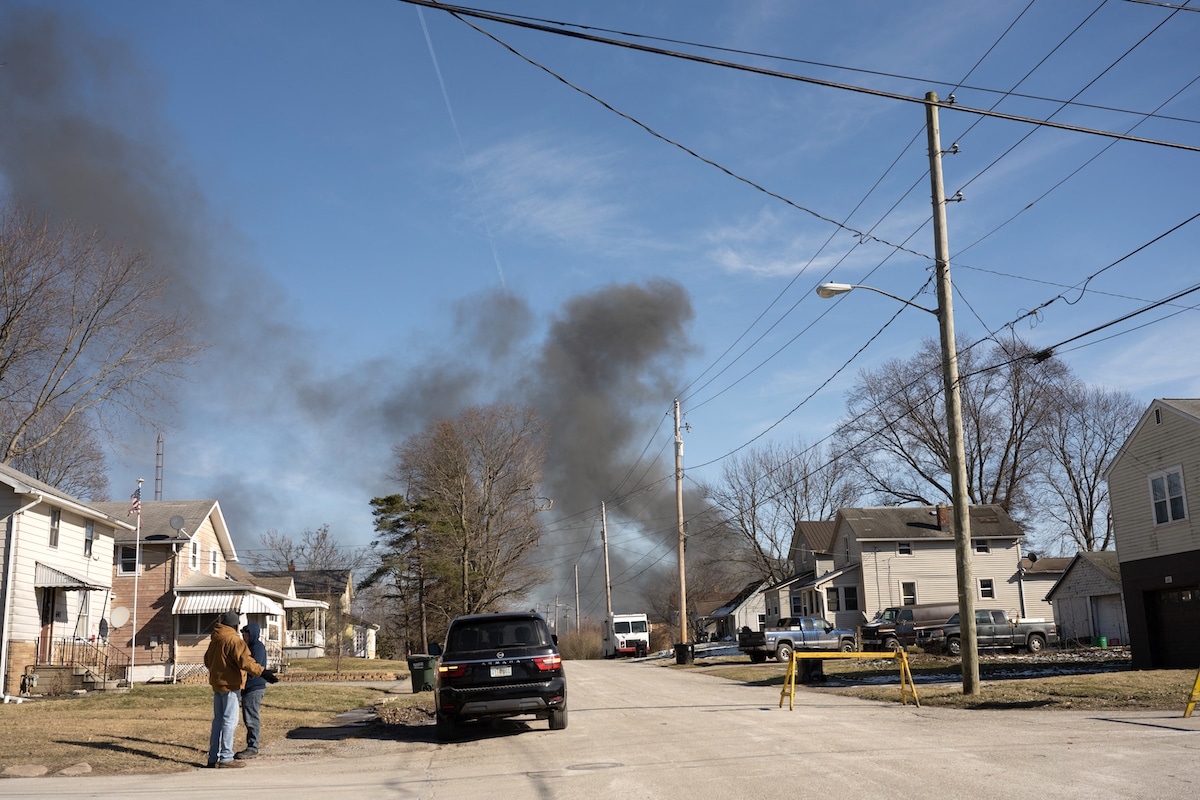Derailed Train Cars in Ohio Were Not Labeled Hazardous

 Why you can trust us
Why you can trust us
Founded in 2005 as an Ohio-based environmental newspaper, EcoWatch is a digital platform dedicated to publishing quality, science-based content on environmental issues, causes, and solutions.
More concerns have been raised in Ohio following a train that derailed while containing hazardous chemicals. In addition to health concerns for local residents, officials now say that the train was passing through Ohio without being labeled as hazardous.
In a news conference on Tuesday, Ohio Governor Mike DeWine said that the train was not marked as a “high hazardous material train,” so state officials were not notified that the train would even be traveling through Ohio before its derailment.
“Frankly, if this is true, this is absurd and we need to look at this,” DeWine said, as reported by CBS News. “Congress needs to take a look at how these things are handled. We should know when we have trains carrying hazardous materials that are going through the state of Ohio.”
The train, operated by Norfolk Southern Railway, derailed in East Palestine, Ohio on February 3. Among the hazardous chemicals its cars were carrying was vinyl chloride, a colorless gas used to make polyvinyl chloride (PVC). According to the National Cancer Institute, exposure to vinyl chloride is linked to increased risks of liver, brain and lung cancers as well as lymphoma and leukemia.
Local residents were evacuated as a cloud of smoke spewed from the derailed trains, but were allowed to return to the area as of February 8. But many people are concerned about the long-lasting effects of the hazardous chemicals on the water and air in the region. The pollution has also spilled into the Ohio River, on which 5 million people depend for drinking water.
The governor said that the pollution from the train derailment wasn’t a serious threat, as Reuters reported. But DeWine and other Ohio officials did warn that local residents near the site of the derailment who have private wells should instead use bottled water.
An estimated 3,500 fish have died following the incident, CBS News reported. The pollution plume in the Ohio River is also moving toward the Mississippi River. Tiffani Kavalec, chief of the Ohio Environmental Protection Agency’s surface water division, said that cities can turn off their drinking water intakes as the plume floats by their area, but that the volume of river water diluted the pollution and current drinking water tests have not raised any concerns from officials, Reuters reported.
Debra Shore, federal Environmental Protection Agency (EPA) regional administrator, told Grist that the EPA has submitted an outline of Norfolk Southern Railroad’s potential liability for releasing hazardous chemicals in the derailment.
In a general statement, Shore said that the EPA has helped screen about 400 homes via a voluntary program, and no vinyl chloride or hydrogen chloride has been detected, and the EPA is monitoring air quality 24/7. The federal EPA and Ohio EPA are also continuing to investigate the spill and its impact on local surface water and groundwater.
The spill follows rail workers’ concerns over shortened inspection times and other worsening working conditions that make a disaster like this one more likely. The rail workers tried to strike over their concerns, but were shut down by President Joe Biden, Environmental Health News reported.
Local environmentalists have created a petition requesting that DeWine declare a federal emergency.
“In 2014, we warned the federal government/EPA with thousands of signatures that a disaster like this could happen,” the petition stated. “Now we are asking for your support to push DeWine to declare a federal emergency, pushing Biden to honor the declaration and send FEMA aid.”
Subscribe to get exclusive updates in our daily newsletter!
By signing up, you agree to the Terms of Use and Privacy Policy & to receive electronic communications from EcoWatch Media Group, which may include marketing promotions, advertisements and sponsored content.

 233k
233k  41k
41k  Subscribe
Subscribe 




